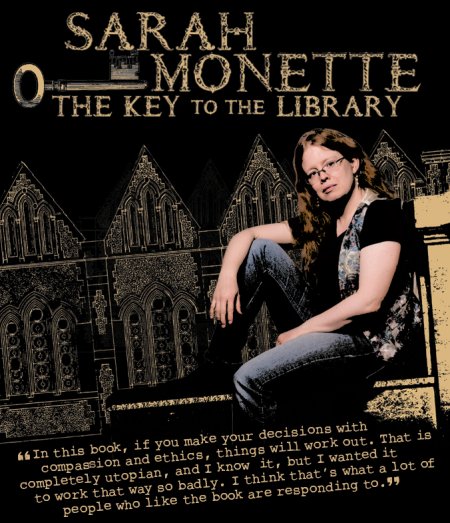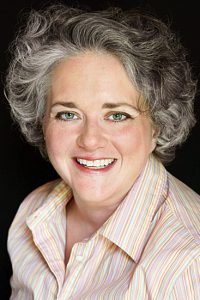Sarah Monette: The Key to the Library

Sarah Monette was born Sarah Elizabeth Smith on November 25, 1974 in Oak Ridge TN, one of the ‘‘secret cities’’ of the Manhattan Project. She studied Classics, English, and French at Case Western Reserve University, graduating summa cum laude in 1996, and earned her Master’s in 1997 and her Ph.D. in English literature in 2004, both at the University of Wisconsin. Her specialty is Renaissance drama, and her dissertation was about revenge tragedies. She married Allen Monette in 1998.
Monette’s first story, ‘‘Three Letters from the Queen of Elfland’’ (2002), won a Gaylactic Spectrum Award. Her short fiction has appeared in Lady Churchill’s Rosebud Wristlet, Alchemy, Strange Horizons, and various other magazines. Several stories about supernaturally-afflicted scholar Kyle Murchison Booth were collected in Shirley Jackson Award finalist The Bone Key (2007), and some non-Booth stories are gathered in Somewhere Beneath Those Waves (2011).
Monette’s first novel Mélusine (2005) was a Tiptree and Crawford nominee, and began fantasy series the Doctrine of Labyrinths, which continued in The Virtu (2006), The Mirador (2007), and Corambis (2009). She co-wrote the Iskryne fantasy novels A Companion to Wolves (2007) and The Tempering of Men (2011) with Elizabeth Bear; An Apprentice to Elves is forthcoming. She also contributed to the shared-world Shadow Unit project with Bear, Will Shetterly, Emma Bull, and others.
Monette’s latest novel is The Goblin Emperor (2014), written under open pseudonym Katherine Addison, winner of the Locus Award for best fantasy novel and a finalist for Hugo, World Fantasy, and Nebula Awards.
In 2006 and 2007, Monette was a finalist for the Campbell Award for best new writer. She lives near Madison WI.
Excerpts from the interview:
‘‘When I sold Melusine and The Virtu to Ace in 2004, they were both written already, and I had a draft of the third book in the series, The Mirador, too. Even though it was very rough, I had something. For the fourth book I had nothing. When I started Corambis after I finished The Mirador, I began absolutely from scratch. I had thought a little about the story, but there was a lot of stuff I didn’t know. The culture and the ethnicities, the war on the continent we don’t see, all of that had to be figured out. I learned in 2007 that I can’t write a book in a year. I did so – technically – because I turned in a manuscript on time, but I was very late with the revisions. The draft was so wrong. I have friends who can produce work quickly, and I admire them deeply, but I’m not one of them – something I did not know before I tried to do it. The first three books came out one per year, then there was a year gap, and Corambis was published in 2009 – during the publishing crash. Hooray.
‘‘Ace took The Virtu out of print two months before Corambis was published, which in a four-book series is… not good. My sales numbers were bad. Ace’s marketing department decided not to put anything on the book to indicate that it was part of a series. That wasn’t my editor’s decision, that was the marketing department, trying to rig a game that just doesn’t rig very well. Nobody knows why people buy books. Down at the bottom of it, nobody knows, so they guess. Ace said, ‘Your numbers are terrible, and we don’t really want another book from you.’ That was bad.
‘‘Tor came along very quickly and said, ‘We want to publish your next book, but we can’t do it under your name because the bookstore computers will pull up your old numbers and everyone will say, ‘‘Why would we buy a book that doesn’t sell?’’ We can’t publish you without a pseudonym.’ Completely standard move – they were saying it to a lot of people. But largely because of the Internet, it doesn’t have to be a secret. I said, ‘Yes, a pseudonym is fine, as long as I can be open about it. I do have a fan base and they need to be able to find my next book.’ I think it’s kind of funny that by the time The Goblin Emperor got published, I don’t think the pseudonym thing was that important anymore. Borders is gone and Barnes & Noble is struggling, and there’s a different model of how publishers sell books to booksellers now. For the name itself, Katherine is a family name on my mother’s side, and Addison was my grandfather’s middle name on my father’s side.
‘‘I wrote The Goblin Emperor quite a long time ago at this point. I started it either while I was working on Mirador or writing Corambis, because when you have something you need to do, your brain goes, ‘What about this other thing? Let’s do that instead.’ I was thinking about elves – the tall, pale, Tolkien elves, probably because of the Lord of the Rings movies. I was thinking about the way they seem so anchored in the kind of world Tolkien made for them. I thought, ‘Why can’t elves have airships? Why can’t I put these things I like together?’ I started thinking about elves and airships, and because I am at heart a horror writer, I thought of the Hindenburg crash. Elves and airships and a terrible flaming accident that kills the emperor.”
…
‘‘When I finish drafts I give them to my husband. He’s right there, I trust his judgment, and he’s very good at seeing practical plot holes that I miss. I was like, ‘This is really boring. Nothing happens in this book.’ He said, ‘No, no, no. You’re fine.’ I think it’s true that if you are interested in what you’re writing, your readers will be interested. If you’re excited about the story, that comes through somehow. I was writing this complicated, dark, plot-filled, twisty series of books starting with Melusine, and they got more and more involved the farther I went. The Goblin Emperor was a clean slate for me. I have been trying my entire career as a writer to figure out how to write high fantasy – Tolkien calls it ‘secondary world fantasy’ – without a quest. There has to be a way, and we have to find it. We have to find another kind of story to tell if we want secondary world fantasy to survive. The Doctrine of Labyrinths series was an attempt to do that as well. My characters spend all their time going back and forth and up and down, so I didn’t really get away from the travel narrative part. The Goblin Emperor is my second attempt. It’s all interior, no quest.
‘‘One of the really popular high fantasy plots is the scullery boy who turns out to be a king. It’s The Sword in the Stone, and The Belgariad, and Memory, Sorrow, and Thorn. I was interested in what happens after the scullery boy is crowned king. The idea mutated a little, but it’s still the core: a boy who has no experience of court is now the emperor and has to deal. In this book, if you make your decisions with compassion and ethics, things will work out. That is completely utopian, and I know it, but I wanted it to work that way so badly. I think that’s what a lot of people who like the book are responding to. It’s the opposite of what most fantasy is doing right now, where bad behavior is rewarded and the morally ambiguous – or, you know, chaotic neutral – is considered more interesting and therefore better than boring virtue. And that’s a position we can get away with in fiction, but is actually really dysfunctional once you start thinking about applying it to real life. I say that not to slam books with morally ambiguous characters – my house is nothing but glass – but because if that’s all you ever do, it’s as limiting as insisting on only writing about characters who are ‘‘good.’’ It’s not that Maia isn’t angry or frightened. He worries about turning into the thing he hates. He asks himself over and over again, ‘How do I not become my father? How do I survive by not being Setheris, not being abusive, not being cold and angry all the time?’ And corrupt, because all of the emperors have been corrupt. Maia has a religious faith. I’m an atheist, but he has belief. I don’t get religion, but I respect the fact that for a lot of people it is part of their ethical system.”
…
‘‘The last book in the current series with Elizabeth Bear, An Apprentice to Elves, is coming out this year. We don’t have anything else planned together because she’s very busy and I’ve been as useful as a screen door on a submarine. I have a couple of things that seem like they’re going to turn into something. I finished a short story the other day, which is the first time that’s happened since 2010, maybe earlier. Doing revision work on An Apprentice to Elves has been helpful because both Bear and Beth have said, ‘This is great, the work you’ve done is great. You’re still at the top of your game.’ That is very reassuring. It’s something to lean on even while getting the words out of my head is hard right now. It’s better than it was because there are actually words.’’
Read the complete interview in the September 2015 issue of Locus Magazine. Interview design by Francesca Myman.







Will there be additional books about the Goblin Emperor Maia ?